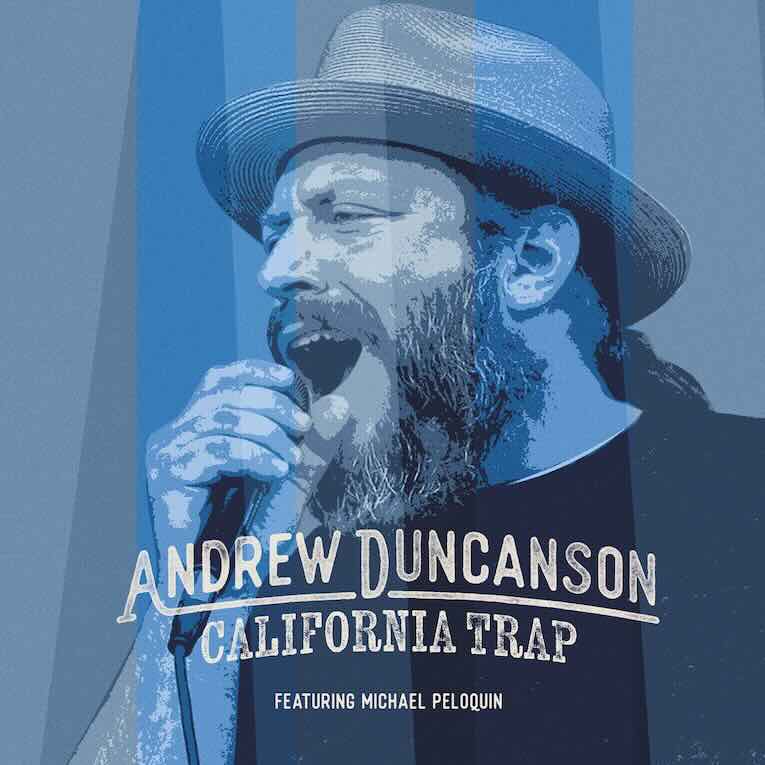
Review: Andrew Duncanson ‘California Trap’
By Jim Hynes
Chances are, that as an ardent blues fan, you’ve heard Andrew Duncanson before, even though California Trap is his first solo release. The Chicago-based Duncanson was the guitarist and deeply soulful voice of the Kilborn Alley Blues Band and the traditional blues trio Dig3. Like so many aspiring blues artists do, Duncanson made the pilgrimage to co-producer Kid Andersen’s Greaseland Studios in San Jose, CA. There he also convened with his friend, and co-producer Michael Peloquin, who plays saxophones and harmonicas, contributes to songwriting, and creates the horn charts throughout the record. The resulting product, recorded in two separate sessions, checks all the boxes for an outstanding blues album – soulful, memorable vocals, raging guitars, wailing harmonicas, sharp horn parts, infusion of soul and R&B, and solid songwriting.
Duncanson wrote ten of this baker’s dozen with Peloquin also contributing an original. They also cover Woody Guthrie’s longstanding chestnut “This Land Is Your Land” and Mike Schermer’s “It’s a Pleasure.” Duncanson and Andersen share the guitar leads, with the latter also playing multiple instruments. Peloquin plays tenor sax on ten tracks, baritone sax on one, as well as harmonica. He leads the four-piece horn section while core members of the Greaseland house band are aboard as well as three background vocalists and The Sons of the Soul Revivers on Schermer’s song. As Tommy Castro says on the back cover, “…They could have gotten by with a lot less, but they went the extra mile…”
The album kicks off rather low key with the horn infused “Relearning to Climb” which takes on a more infectious flavor with the chorus “I’m trying a new state of mind, re-learning how to climb.” Duncanson drips with emotion in the swaying lament “Naw, Naw, Naw,” bolstered by the background vocalists. “Hold Me Back” features Peloquin’s blues harp as the band embraces a sturdy shuffle. It’s Kid Andersen’s stinging guitar that brings us into the title track, a slow, simmering blues with Duncanson belting out the vocal in the fashion of the great blues shouters and Baxter Robertson going barrelhouse on the piano. Robertson then cooks up a funky bassline on his clavinet with the staccato horns on top for the soulful strut of standout “Town Saint” with Duncanson ripping off a succinct guitar solo along with Doug Rowan on baritone, Mike Rinta on trombone, and Peloquin on tenor filling the bottom. Meanwhile the constant refrain of the background vocalists “Town saint, town sinner- drinks beer says grace at the family dinner” wafts throughout the song. “Outer Space” plays to a full tilt shuffle with Jim Pugh’s piano and Peloquin’s blues harp backing Duncanson’s earthy vocal while Andersen rather whimsically takes up an array of waterphone, theremin, and mini-moog; and Peloquin pitches in with deep space mouthpiece squawks. Castro’s quote seems to apply here. They were in a different zone.
Peloquin’s “What Kind of Man” is a steady tempo soulful plea with a terrific horn arrangement and Guthrie’s anthem works surprising well in this context, as the arrangement is tailored on the interpretation of Sharon Jones and the Dap-Kings. Schermer’s tune is an ode to friendship with Peloquin’s graceful chromatic harp solo and the gospel refrains from The Sons of the Soul Revivers. Duncanson’s “Next Life” has one his most potent vocals, stinging guitar from Andersen, and another sharp horn chart. The R&B-tinged closer “Better Off Now” sends us off in an uplifting mood as Duncanson sings about so much joy over the full complement of horns and Peloquin’s brief solo.
Duncanson’s vocals are the draw but there’s so much more. Blues and soul don’t get any better than on this stellar outing.
“Take A Ride Until I Forget You”
Andrew Duncanson website

Leave A Comment